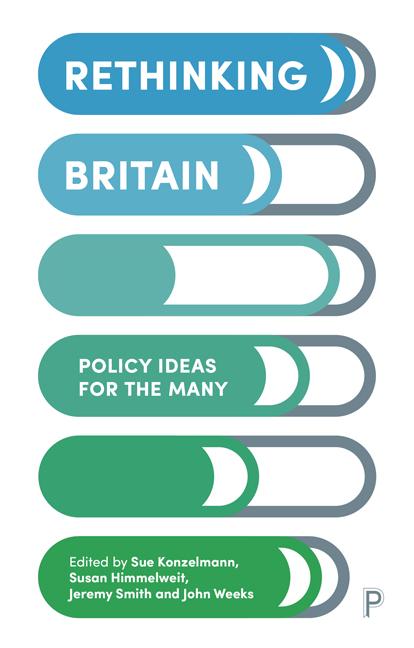Book contents
- Frontmatter
- Contents
- List of Tables and Figures
- The Contributors
- Foreword
- Introduction
- Interlude: ‘Mirror, Mirror, On the Wall – Who has the Highest Debt of All?’
- Part One Building a Full-Employment Economy: Introduction
- Part Two Public Investment – Prioritising Society Rather than Profit: Introduction
- Part Three Making Finance Work for Society: Introduction
- Part Four Genuine Social Security: Introduction
- Part Five How to provide for Social Needs: Introduction
- Conclusion
- Jargon Busters
- References and Further Reading
- Index
5 - How do we make Drug Prices an Easier Pill for the NHS to Swallow?
Published online by Cambridge University Press: 11 March 2021
- Frontmatter
- Contents
- List of Tables and Figures
- The Contributors
- Foreword
- Introduction
- Interlude: ‘Mirror, Mirror, On the Wall – Who has the Highest Debt of All?’
- Part One Building a Full-Employment Economy: Introduction
- Part Two Public Investment – Prioritising Society Rather than Profit: Introduction
- Part Three Making Finance Work for Society: Introduction
- Part Four Genuine Social Security: Introduction
- Part Five How to provide for Social Needs: Introduction
- Conclusion
- Jargon Busters
- References and Further Reading
- Index
Summary
What's the issue?
The pharmaceutical industry is charging ever-higher prices for its drugs, making them unaffordable for individuals and public healthcare systems. While the UK NHS, unlike the US government, negotiates drug prices with manufacturers, there have been some instances where it has been unable to reach an agreement on providing potentially lifesaving drugs to patients in the UK. Even the negotiated prices are rising rapidly, taking up an ever-larger share of the NHS’ budget.
What policy should a progressive government implement to reduce the burden on the NHS of overall expenditure on drugs without the rationing of drugs threatening the nation's health?
Analysis
It is government policy, not market processes, which cause high drug prices. Government legislation grants patent monopolies that have the negative effects that free market-oriented economists typically ascribe to government interference in the market. Altering government policy on patents would make drugs cheaper for the NHS, and thus increase provision.
Governments grant patent monopolies to provide an incentive for research and development of new drugs. The same purpose could be achieved by governments funding research directly, either carried directly within the public sector (for example, in the NHS or universities) or contracted out to private companies, including those that now do patent-supported research.
Public funding would allow patents to be placed in the public domain, facilitating the production of generic drugs. Such open access to patent rights would be restricted to the UK and countries with which there are reciprocal agreements. The UK government would derive revenue from patent rights in other countries. In almost all cases this approach would result in drugs being available to the NHS at a low cost, because few drugs are expensive to manufacture. Patents and other governmentgranted monopolies make drugs expensive, not the cost of producing them.
In addition to the savings from having drugs sold as generics, there would also be the benefit to public health resulting from full and open information about the safety and effectiveness of the drug. Patents give drug companies an incentive to misrepresent the effectiveness of their drugs and to conceal evidence that is harmful to patients.
- Type
- Chapter
- Information
- Rethinking BritainPolicy Ideas for the Many, pp. 202 - 205Publisher: Bristol University PressPrint publication year: 2019



